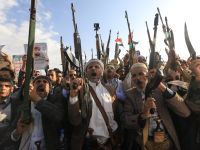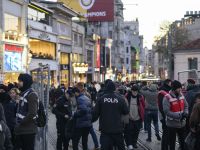Egyptian Elections Explained
With the third round for Upper Assembly of Parliament underway, we revisit the system of Egyptian elections that has left some people still uninitiated if not stumped on the what's what and the who's who.
With the voting beginning on 28 November, after some initial delays, the people, spread across Egypt’s 27 governorates, continue to cast ballots for representatives in each of the two chambers in the bicameral or dual-tiered Egyptian parliament.
The problem is, it’s not the international audiences who need to understand how it works--it’s the Egyptian voting public. Having one of the region’s lowest literacy rates, the task of getting all of Egypt’s 80-million-plus people to count will be hard work; about half of these will not be eligible to vote (some because of age, others because of reasons of residency and illiteracy). How any political party can possibly manage to forward a platform which can even pretend to represent all of these people is anybody’s guess. As with everything, when people are swamped with too much choice, a couple of 'brands' tend to win-all. So far, this seems to have worked out for the Muslim Brotherhood and Salafi contingents who have wracked up a considerable 70% of the vote after the 3rd round of votes for the People Assembly.
That was not what the Nile’s interim military leadership concerned themselves with, however; all they had to worry about was getting the show on the road. That they did, and the elections for the legislative Lower House, also known as the People’s Assembly (Majlis Ash Shaab), which have lasted for six weeks, should be over by the 13 January. It won’t all be over then, though: Elections for the Shura Council, which is the Upper House (kind of like the Senate in the US or the House of Lords in the UK), will only begin on 29 January, and are scheduled to be completed only near the ides of March.
Under rules set by Egypt's interim military rulers, the election process starts with six weeks of staggered voting for the lower house of parliament, known as the People's Assembly, with final results expected on January 13, 2012. The process closes up with another six-week period of voting for the upper house, or Shura Council, beginning on January 29 and ending in mid-March.
Why staggered stages?
The Majlis al-Shaab, or People’s Assembly, is the lower house of a two-tier Egyptian parliament. Their function is legislative, to draft laws, oversee the president's ability to institute emergency law, and help to choose the 100-member council that will draft Egypt's permanent post-revolutionary constitution.
There needs to be three stages to handle the ballots of a population over 80 million (of which around half are eligible to vote).
Nine governorates went to the polls in the initial stage. Subsequent rounds in other districts followed on December 14 and this last week starting January 3, saw the final set of governorates have their turn, with runoff ballots (as necessary) one week after each initial vote.
This last week we saw Egypt complete its final round of elections for the lower assembly of parliament (in a double-tiered parliament).
The 498 members of the People's Assembly will serve five-year terms.
A reminder of the 3 stages for Lower House
November 28 – 29
1st stage of lower house election in major urban centers of Cairo and Alexandria and seven other provinces. Run-off vote: December 5 – 6.
December 14 – 15
2nd stage of voting in nine other provinces, including Aswan, Beni Suef, Giza, Ismailia, Suez and Sohag. Run-off vote: December 21 – 22.
January 3 – 4
3rd stage of voting in remaining nine provinces, including al-Gharbiya, North Sinai and South Sinai. Run-off vote (to be taken up): January 10 – 11.
January 29
1st stage of upper house election begins. Run-off vote: February 5.
February 14
2nd stage of voting. Run-off vote: February 21.
March 4
3rd stage of voting. Run-off vote: March 11.
Complex Set-up Uncovered:
The convoluted electoral rules combine elements of both majoritarian and proportional-representation systems. One-third of the People's Assembly - 166 MPs - will be elected using a majoritarian system, in which each district is assigned two representatives. The other two-thirds will be elected using party-list proportional representation. The dual electoral system that has voters casting two ballots, prescribes that half of the seats are reserved for "workers and farmers," a hard-set quota which can leave winning candidates disqualified because of their profession.
Political activity in Egypt under the 30-year regime of Husni Mubarak was very simple. Autocratic rule often is straightforward.
Parliament was always controlled by Mubarak's National Democratic Party, which never failed to secure a majority, dominating both houses of parliament. The "presidential ballot" was then simply a yes-or-no referendum on Mubarak's rule.
Alliances now are more complex and nuanced (see charts to the left.)
Post revolution, people have been introduced to the political participation they were denied. For some, this may be overwhelming given the party choices and alliance divisions to get a handle on.
Description of what’s out there in summary:
Since the ouster, more than 40 parties and 6,000 candidates have reportedly registered to participate in what should be the first free and fair elections visited on the Egypt of Gamel Abdel Nasser's military coup in 1952.
A substantial number are new political parties which have materialized since Mubarak's successful ouster which buoyed people to politically re-group. Voters will have more than 6,700 candidates to choose from. They represent 47 different political parties, many of which were only established in the nine months after Husni Mubarak's Egypt.
Egypt's new parties scale the political spectrum "from neo-liberals pushing for free trade and women’s rights to hardline Islamists who want to cut off the hands of thieves. There are moderate Muslims who insist Egypt should be a civil state, mystical Sufis who fear the rise of fundamentalist Salafis, and old-school socialists who want to nationalise industry and expand the already huge public sector."
Each stage begins with two days of voting to give people enough time to cast their ballots. In constituencies where no candidate wins an absolute majority in the initial voting, run-off elections will be held a week later, also over two days.
Each voter makes three choices on a ballot for the lower house – one for a political grouping, one for a professional candidate and one for a farmer/worker.
This may sound like a potential free for all, risking confusion begetting chaos. Spoilt for choice, can Egyptians be counted on to make the right choice for their hopeful country.. (See attached info-graphics to the left for more understanding).
The new parliament is expected to have a strong Islamist bloc led by the Muslim Brotherhood, some liberal alliances and some reformatted elements of Mubarak's old party.
Some individuals crowding the political space, of course, are more famous than the others, including telecommunications tycoon Naguib Sawiris, the founder of the Free Egyptians Party; Saad al-Katatni, the head of the Muslim Brotherhood's new Freedom and Justice Party (FJP); and Amr Hamzawy, the head of the liberal Egypt Freedom Party.
Polling centres continued receiving voters in the final phase of the Peoples' Assembly elections. The third phase is in nine governorates, namely Dakahliya, Minya, Qaliubiya, Gharbiya, Qena, New Valley, Matrouh, North Sinai and South Sinai
Another staggered three stages will follow for the Shura Council between January and March 2012. These ballot stages see Egypt's provinces voting in the same order as for the lower house. The upper house has a consultative role and is less powerful than the lower assembly. The buzz about the upper house therefore may well have abated.
What Will Come to Pass for Egypt?
Many are wondering how they will see Egypt's 'change' and in what form. After the election process is complete, the ruling military council promises that the parliament will write a new Egyptian constitution. It has yet to issue a timetable for the document to be drafted and approved.
Then, a presidential election will follow in July 2012 or thereabouts, according to the Supreme Council of the Armed Forces (SCAF), Egypt's ruling military force (or transitory ruler) until a transfer treaty can come about. The military has promised to hand over its presidential powers to an elected civilian leader in July.
Rendering it quite a quagmire or minefield to navigate as observer, analyst or revolution aficianado whose eyes have not left the Arab pioneers since this Arab Awakening attended the world’s media, and looked here to stay and not just a 2011 trend. As protracted as these elections are, they have managed to hold the world’s gaze as they are considered part of the unfolding drama of revolutionizing Egypt.
A break from the past in Egyptian run of the mill elections:
These electoral choices are being intensely scrutinised in a process that has become a crucial test of whether the idealism of Tahrir Square and the "Arab Spring", having taken out the old dictatorial regime, can be harnessed to build new democratic institutions in its place. And can these be delivered to represent every-Egyptian by parties regarded as fundamentalist choices, or far-out rather than middle ground, since that may be what Egypt wants.
2010’s electoral scandal was one of the triggers for the Jan 25 Revolution The electoral disgrace of National Democratic Party rigging was one of the catalysts for the January 25 Revolution. A pretty predictable, nontheless mandatory, show was once the story: Pre-2011, Mubarak was "re-elected" every six years, with 90 per cent of the vote, and parliamentary elections were usually fixed to ensure a clear victory for his NDP.
Now today's current Egyptian elections have been as much part of the story as the Egyptian revolution itself. Post revolution in the first national elections, the people were far more galvanized to vote. With the transitional government headed up by the military SCAF, the Egyptian record of violence and intimidation was expected to be a thing of the pre-revoution world. People felt safer and braver coming out to vote without fear of reprisals, bribery, intimidation clouding the process. Formerly, since to vote one had to register under the police, people feared exposing themselves for fear of being ‘wanted’ for some other political or arbitrary, and preferred to stay hidden and out of the political public voting space. They did not feel they had a democratic hand to play.
Power to the People
Of course there were security concerns brought about by the pre-election scuffle between SCAF and the people. Empowerment of the people or, more specifically, their taking power - at least some of it - from the ruling military party and putting it in the hands of a civilian government has dominated all other issues in this parliamentary palaver. Some doubt the new parliament will be able to check SCAF's powers, but there is also the belief that the elections are an essential first step towards democracy (with a new constitution and president).
How the new parliament will function and whether it will be able to resolve a standoff with the armed forces over how much power they will retain under a new constitution to be written this year is the real crux, or test of democracy and change realized.
Since the results won’t become clear until but the final make-up of the lower and upper houses of parliament are drawn, the measure of the revolution's success will not accessible until March at the very earliest, if not mid-year.
A High Turnout:
A generally high turn out, only falling off toward the last stage of lower assembly voting, gave an indication, of the pent-up appetite for democracy - allowed free expression at last.
High numbers were keenly felt in the first couple of voting rounds, tapering off a little by the third round this week, in the absence of as much media-hype and perhaps given less proximity to the excitement of the 2011 revolution itself. The collective enthusiasm that had lingered through the first rounds, was being tested by the distractions of New Year and even Coptic Christmas perhaps. Women voters however consistently scored record numbers, particularly in some of the more conservative upper Egypt, where women are known to not come out to vote. Egypt witnessed new voting behaviors all around. The cry for change was heedd in a more proactive people, now confidently on board with their Egypt, not Mubarak’s Egypt. Egyptians, by the third round of People Assembly voting, were an old hand at democracy, maybe even beginning to take it for granted.
By and large people have held to the positive view that good things come to those who wait (since they have patiently wasted impotent years) and were not averse to queue with the rest of the voting rabble. "We must take part, we must vote, even if we stand here for five hours, so that Egypt can go forward," said one convinced voter.
And people have been saying they feel Egyptian and they feel like superheroes, empowered to a staggering degree that they are not intimidated by registering details with the police, or being threatened or bribed into casting vote. Their feeling now is that they finally have a real stake in their country's future. One can only hope that this feeling is realized with some reality of change effected in parliament, and in the country's rungs of power. Since parliament won’t be with power until later on in the proceeding – the parliament will be inactive and the military will still rule (unelected) for a good time in the meanwhile - many were hoping to expedite the process of civilian-rule sooner than later.
What encouraged a good turnout, were promises and hopes of a safer experience; and as it turned out, more logistical than security issues, plagued the elections.
Once upset by violence, these elections were now orderly and relatively a safe bet. They were not without some petty incidents and accusations of infringements amounting to cheating, especially levelled at the Muslim Brotherhood and Salafist wings, Freedom and Justice Party (FJP), and Al Nour Party, respectively.
These Muslim-heavyweight parties were accused of trying to campaign at poll stage, leaving some bemused witnesses wondering why on Earth a Party of God would resort to cheating.
Otherwise, a restored confidence in the system buoyed up voters, even in the wake of security concerns between army and people, and prevailed. In the end, a Tahrir Square sit in was broken in favor of not hampering the democratic vote, ahead of calls for an immediate power transfer handover to the people.
The Muslim Brotherhood by now has shown all indication of holding forth at the new parliament, at first tipped to lead, and now by the first week of January, carrying many votes ahead of contenders. MB’s wing FJP was accused of petty infringements but nothing like the thuggery of a bygone era.
A short-lived revolution?
Some of the enthusiasm for 'change' did not really catch on after the Tahrir phenomenon. "I'm not with the kids in Tahrir, and I'm not with the Muslim Brotherhood," said one much-quoted woman. "It will take a long time for the people to change their minds. We made a revolution, and it was great, but now it's time to move forward." Liberal and newly formed parties did not appear to take a hold, as results showed the religious alliances succeeding more than their secular or revolutionary counterparts. Liberal and secular groups that led the uprising that forced Mubarak from power have performed poorly in the staggered elections. Instead the fight has seemed to center mainly between the FJ party and Salafist party.
Final results are expected on January 13, 2012, though preliminary results are indicating Muslim Brotherhood ascendancy. Over 70% Islamist control of parliament is predicted.
The process ends with another six-week period of voting for the upper house, or Shura Council, beginning on January 29 and ending in mid-March.
The big question shadowing even the electoral results is still what deal will be struck between the FJP and the SCAF over parliament's powers?
And will the FJP now enter into any alliances or political blocs?
- The exact numbers of seats won by each group so far cannot be verified because of the complicated voting system in place.
To reiterate, some seats are determined in a direct race between candidates, while others are divvied out in proportion to each party's acquired percentage of overall votes. The election commission is to announce the actual numbers of seats at the end of the entire process. Final election results for the lower house are due to be announced Jan. 13.
By Dina Dabbous








